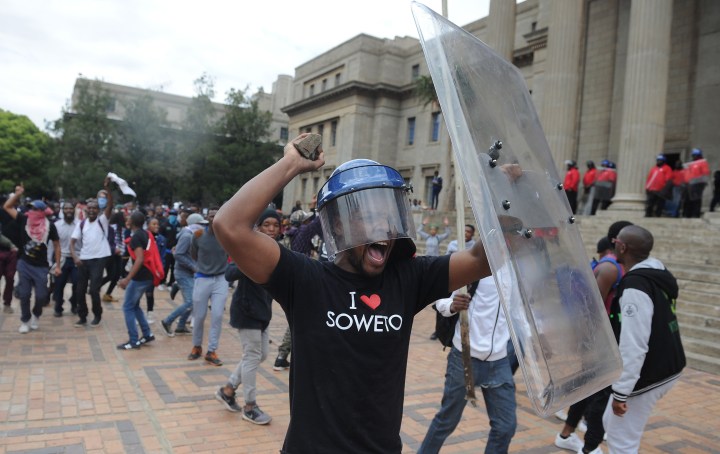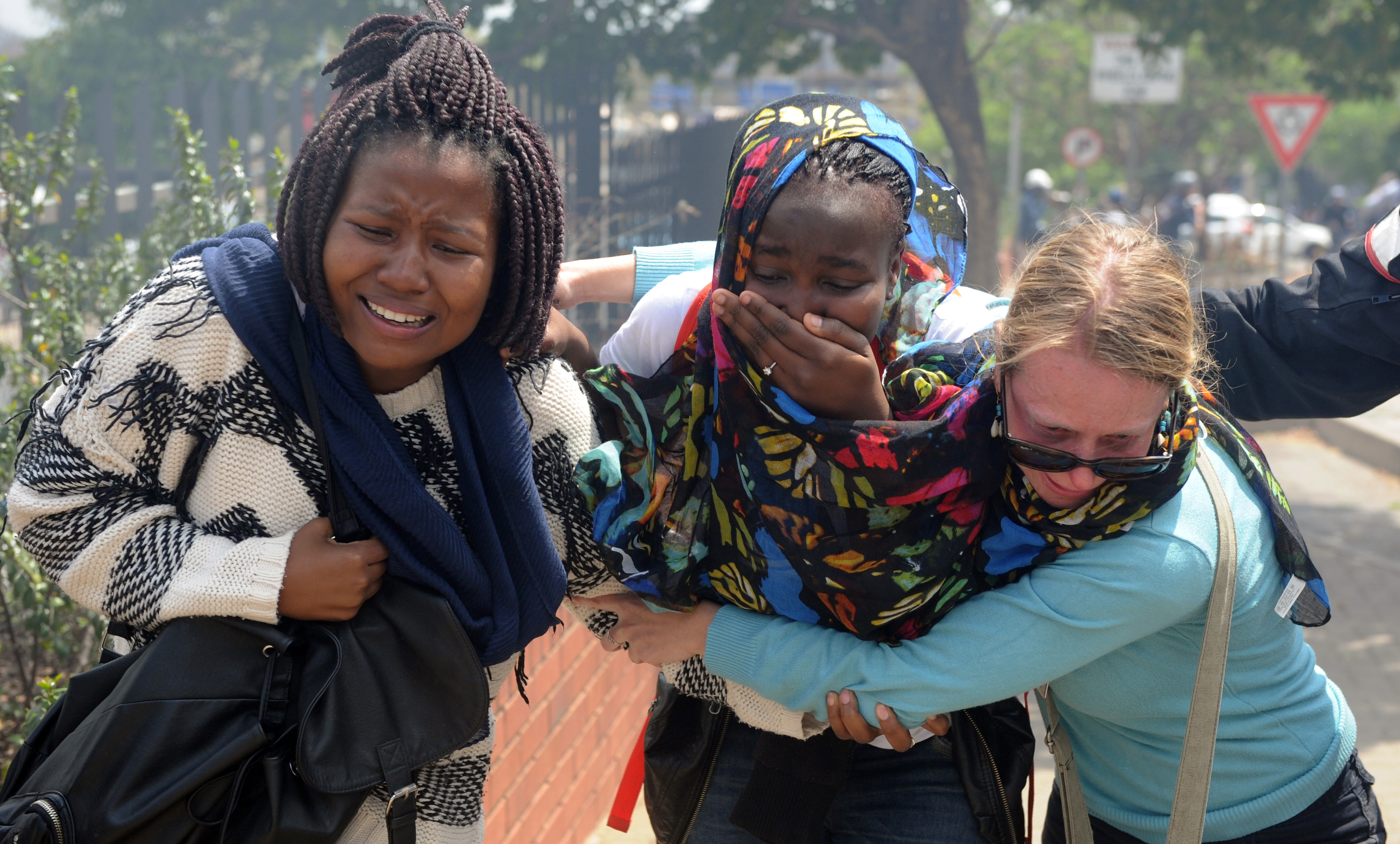DIRE LEARNING
South African students still battling ballooning debt despite protests and promises

The debt owed to institutions of higher learning is ballooning and requires a national intervention from the government. But years of task teams and promises have achieved nothing.
Student debt has been a continuing problem for South Africa’s economy and higher education sector owing to the limited funding provided by the Department of Higher Education and Training. It is simply not enough to fund all students who are enrolled in tertiary institutions.
Because of inflation, the increased cost of living, rising student fees and a lack of sustainable solutions, the national student debt has gradually increased by at least R2-billion annually over the past decade. By the 2017-18 academic year, student debt already sat at an astonishing R11.3-billion.
DM168 was unable to confirm the exact debt figures before 2017, despite multiple attempts to get these numbers. What is confirmed is that the student debt crisis snowballed from R13.162-billion in the 2019-20 academic year to R16.5-billion in 2021-22.
The March 2021 protests over university student debts made it clear that few changes had been made to correct the continuing issues around tertiary education funding.
According to Christopher Webb, a South African social anthropologist, the student debt is a part of the inheritance left behind by apartheid’s enforcement of racial capitalism. Research Professional News revealed in 2021 that historically white, research-driven universities like Cape Town, Stellenbosch, Rhodes and Pretoria had far less debt than traditionally black universities or universities of technology.

An activist demonstrates as more than 1,000 University of Cape Town students gather at the Jameson Plaza to discuss free education on 1 November 2017. (Photo: Gallo Images / Netwerk24 / Jaco Marais)
According to the article, as of 2021, Tshwane University of Technology’s student debt was R4.4-billion.
The debt of the Cape Peninsula University of Technology stood at R1.13-billion and that of the Central University of Technology at R1.78-billion. Among the top research universities, KwaZulu-Natal and Witwatersrand (Wits University) were owed the most, with debts of R1.7-billion and R1.062-billion, respectively.
Read in Daily Maverick: “Budget boost brings some relief to student aid scheme, but varsities’ problems pile up”
Stellenbosch University’s student debt was R16.3-million, whereas Rhodes University, at R15.3-million, had the lowest arrears. The University of Cape Town (UCT) had the lowest student debt of all South African universities, amounting to R14.1-million.
A protest movement against increases in student fees, #FeesMustFall, was launched in October 2015. It also called for increased government funding of universities.
A crucial part of the agenda was to relieve students of the strain of ever- increasing fees at higher education institutions, which limited access and made it hard for some students to persist with their studies.
With the limited funding from the National Student Financial Aid Scheme (NSFAS) not meeting the financial needs of all disadvantaged students, registered students have continued to accumulate debt.
As a result, Webb argues, students with outstanding debt have either not been allowed to register to further their studies until their debt is cleared, or been barred from graduating.
Webb says debt not only affects the students who carry it, but also has broader socioeconomic consequences. Debt owed to universities affects their functionality, which is crucial to the economy. Historical student debt has an impact on our labour force because it affects people’s ability to graduate and, as a consequence, their ability to find a job. Thus, student debt adds to our unemployment crisis.
Indebted students’ experiences
Tumelo Rampedi, a postgraduate accounting science student at the University of Johannesburg, is blocked from registration at the institution owing to outstanding fees for last year. Rampedi says the university told him he needs to pay 50% of his outstanding fees (R33,478.74) plus the registration fee for this year before he can register.
Read in Daily Maverick: “NSFAS allowances to increase by 5%, says Blade Nzimande”
DM168 also spoke to Ontirese Phetlhu, a master’s in education candidate at UCT. Phetlhu has been a student at both UCT and Wits University and has dealt with debt at both. He received NSFAS funding during his undergraduate years at UCT. Despite having a bursary at Wits University, he accrued debt because he had to fund his accommodation from his own pocket.

Phetlhu said his student debt accumulated when he decided to pursue a postgraduate qualification, since NSFAS does not fund postgraduate courses. In 2020, during the Covid-19 pandemic, he resigned from work, which was his only source of funding for his postgraduate studies, because the pressure of studying and working under the burden of debt was too much. He owes money to Wits University, which he is paying off in instalments, and is working on an arrangement with UCT to pay off his debt there.
Phetlhu said the government needed to create sustainable solutions for student debt to ensure people have fair and equal access to tertiary education.
As of 2022, at least 120,000 students were barred from graduating because they collectively owed universities R7-billion. This is according to Linda Meyer, director for operations and sector support at Universities South Africa (USAf), who was speaking during a meeting of the parliamentary Portfolio Committee on Higher Education, Science and Technology in March that year.
No solution in sight
In 2016, NSFAS announced it had cleared the historical debts of all students who qualified for its funding and had studied between 2013 and 2015. At the time, the historical debt amounted to R2.543-billion.
When former president Jacob Zuma made his free education announcement in December 2017, he said historical debt would be further dealt with by NSFAS and the Department of Higher Education and Training.
But instead the student debt crisis had ballooned to more than R16.5-billion, Higher Education Minister Blade Nzimande said last month.
Visit Daily Maverick’s home page for more news, analysis and investigations
At the end of 2022, the Department of Higher Education and Training was in discussion with private banks about the possibility of a loan scheme supported by government guarantees to help students fund their studies.
Commenting on this initiative, Mateboho Green, manager of corporate communication at USAf, said: “As part of its submission to the Heher Commission in late 2016, USAf proposed a range of funding options, including one that suggested combining state resources for the poorest of the poor and private sector-backed study loans to students in the missing middle.
“The Heher Commission recommendations fell away when [Zuma] announced a fee-free higher education system… [This] changed the NSFAS model from the then loan scheme to the full bursaries scheme that it is today.”

Wits University students flee teargas and stun grenades during the #FeesMustFall protests in Johannesburg on 4 October 2016. (Photo: Gallo Images / Beeld / Felix Dlangamandla)
Green added: “Since 2020, we have witnessed state bursaries being artificially sustained as the [department] has tended to make up for shortfalls in the NSFAS funding. That makes the long-term sustainability of the 2017 solution a major concern to USAf, which therefore looks to the state to identify alternative and more sustainable funding mechanisms for the future.”
Green said USAf was still waiting for Nzimande to announce what funding model the state would be putting forward for the long-term sustainability of the higher education sector. This was after USAf had been in consultation with a ministerial task team over the past two years. She added that a comprehensive and sustainable funding model that includes loan and bursary components for the so-called missing middle would be the answer to the student debt crisis.
An associate professor at Wits University, William Gumede, argues that private financial institutions should fund all students with loans underwritten by the state. He says loan repayments should be structured over the lifetime of recipients and tailored to their income after graduating.
“No student with outstanding debts should be prevented from receiving their academic results, graduating or seeking employment,” added Gumede. DM168
This story first appeared in our weekly Daily Maverick 168 newspaper, which is available countrywide for R25.




















 Become an Insider
Become an Insider
I am so tired of this. Former prisoner zuma in one his last floaters left behind free university for all. People might think in the bad old days the whiteys had it good. I started work with just under five years worth of my starting salary as student debt. Yes my salary shot up because I was an articled slave at first. Yet, how do these kids think life works out?
You chill for 5y at varsity for free to finish you 3y Political Science degree with academic and accommodation paid with an allowance and then roam off to the high paid job?
Agree with every comment you’ve made….unrealistic expectations have been created by the ANC at the same time that education standards have dropped to the lowest common denominator under the same ANC….it’s amazing that educated people still think that “freedom” means getting things for free!” In the good old days, students worked two or three really crap jobs to pay off their student debt and university on campus accommodation was not trashed to the extent it became unliveable! Nothing wrong with the institutions, only the students!